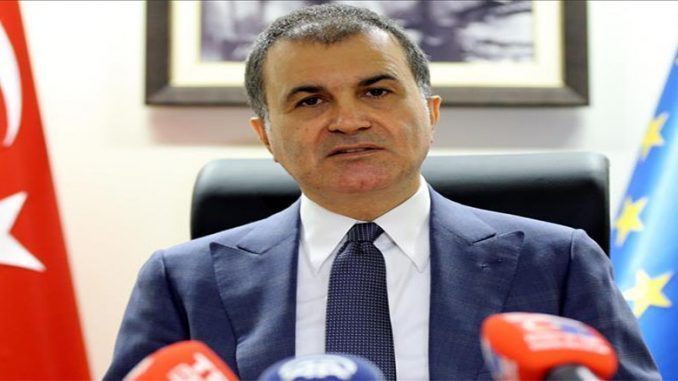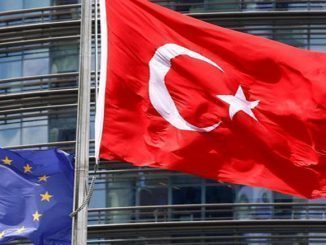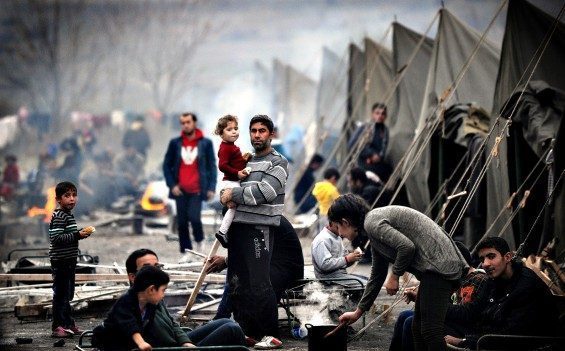
EU affairs minister says bloc should support Turkey during this difficult period in region
Speaking at the 36th Turkey-EU Joint Advisory Committee in Brussels on Tuesday, Omer Celik said Turkey’s “strategic aim” in the EU accession talks is to get full membership.
“The EU should support Turkey during this difficult period in the region by understanding the reasons for the fight against terrorism, by providing visa liberalization and especially by accelerating the accession process,” Celik said.
Turkey’s accession talks began in 2005. Negotiations hit a stalemate in 2007 because of Turkey’s position on the Cyprus issue. German and French governments had also opposed the country’s full EU membership.
To gain membership, Turkey has to successfully conclude negotiations with the EU over 35 policy chapters that involve reforms and the adoption of European standards.
Celik said Turkey was ready to open EU chapters 23 and 24 about the judiciary and fundamental rights as well as justice and freedoms.
He said it was “double standard” to criticize Turkey without opening these EU chapters.
Minute silence for July 15
Earlier this month, the European Parliament approved a 2016 commission report on Turkey, which called on EU member states to suspend Turkey’s long-running accession talks if constitutional changes endorsed in an April 16 referendum went ahead “unchanged”.
The vote was non-binding in terms of the EU decision-making, as the approved version of the report will be sent back to the European Commission to agree on the changes made by the parliament.
Speaking to reporters later in the day at the Turkey’s EU permanent representation in Brussels, Celik praised the decision to observe a one-minute silence at the beginning of the committee meeting to mark the one-year anniversary of the defeated coup in Turkey.
“Since the July 15 coup attempt, I have attended many meetings under the framework of the European Union. This is the first time a moment of silence has been observed,” he said.
The Turkish minister also inaugurated a photo exhibition by Anadolu Agency on the July 15 coup attempt.
According to the Turkish government, Fetullah Terrorist Organization (FETO) and its U.S.-based leader Fetullah Gulen orchestrated the defeated coup of July 15, 2016, which left 250 people martyred and nearly 2,200 injured.
Celik said that during the meeting, the Cyprus issue was also discussed.
Cyprus issue discussed
“Certainly, Turkey is on the side of solution. Although the Turkish side has shown a positive approach [during the talks in Switzerland], this last solution chance has been missed.”
The minister said Turkey would support an equal and a sovereign state on the island.
“A proposal that calls for Turkish troops to not be on the island at the start of negotiations is out of the question,” he said.
The latest attempt to reunite the island failed earlier this month.
The Eastern Mediterranean island has been divided since 1974 when a Greek Cypriot coup was followed by violence against the island’s Turks, and Ankara’s intervention as a guarantor power.
Celik said he expected Turkey-EU relations to intensify in the coming days.
“Next week, we will have a high-level dialogue here. We will come with our foreign minister,” he said, adding they would meet EU foreign policy chief Federica Mogherini and Commissioner Johannes Hahn.
Turkey-EU refugee deal
He added that September and October would see meetings linked to energy and economy.
“Our preparation for a summit is ongoing. We have not set a date for the summit,” he added.
The Turkish minister also described the Turkey-EU deal on refugees, which was signed last year in March, as “the only success story” of the bloc.
The readmission deal allows for the return of “irregular migrants” to Turkey from Greece in exchange for Syrian refugees to be relocated within the EU.
In return, the EU promised Turkey an acceleration of Turkey’s EU membership bid and visa-free travel for Turkish nationals within the Schengen area, on the condition that Ankara meets 72 requirements set by the EU.
The deal includes 6 billion euros ($6.8 billion) in aid package to help Turkey care for millions of refugees hosted in the country.
Celik said although Turkey was sticking to the agreement, the EU was violating it in a number of ways such as not opening chapters of Turkey’s accession talks, and not realizing visa-free travel for Turkish citizens as well as not sending the aid package.



